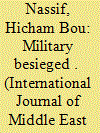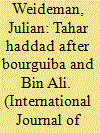| Srl | Item |
| 1 |
ID:
139901


|
|
|
|
|
| Summary/Abstract |
This article draws on extensive fieldwork and original data to trace the transformation of civil–military relations in Tunisia during the tenure of the former president Zayn al-ʿAbidin bin ʿAli (1987–2011). The republican ethos of the Tunisian Armed Forces (al-Quwwat al-Musallaha al-Tunusiyya) is often stressed to explain its traditional political quiescence. However, I maintain that it was the active hostility of the military's rivals within the Bin ʿAli regime that prevented Tunisian generals from playing a greater role in their country's public life. I disaggregate Bin ʿAli's regime into its fundamental institutional components—namely, the presidency, the party, the police, and the military—and investigate rivalries and alliances that structured the struggle for influence and power between Bin ʿAli's rise to the presidency and his downfall. I argue that there is a direct and causal relationship between the 2010–11 uprising and inter- and intrainstitutional dynamics within the regime. In other words, the study of contemporary Tunisian civil–military relations is critical to understanding the breakdown of the Bin ʿAli regime.
|
|
|
|
|
|
|
|
|
|
|
|
|
|
|
|
| 2 |
ID:
145057


|
|
|
|
|
| Summary/Abstract |
Under the Bourguiba and Bin ʿAli regimes, the early 20th-century women's rights advocate Tahar Haddad (1899–1935) was a symbol of “state feminism.” Nationalist intellectuals traced the 1956 Personal Status Code to Haddad's work, and Bourguiba and Bin ʿAli claimed to “uphold” his ideals and “avenge” the persecution he suffered at the hands of the ʿulamaʾ at the Zaytuna mosque-university. Breaking with “old regime” narratives, this article studies Haddad as a reformist within Tunisia's religious establishment. Haddad's example challenges the idea that Islamic reformists “opened the door to” secularists in the Arab world. After independence, Haddad's ideas were not a starting point for Tunisia's presidents, but a reference point available to every actor in the political landscape.
|
|
|
|
|
|
|
|
|
|
|
|
|
|
|
|